Sometimes I find myself hungering for solitude, and there are occasions when I’m almost painfully grateful to spend a night with my prints, my CDs, my iBook, and my trusty TV, watching What’s My Line?, keeping my own counsel and staying up as late as I like. I’ve recently discovered, much to my surprise, that I even like vacationing alone. At the same time, I’m no hermit, and like most singletons, I find there are other times when being alone is no fun at all. One is when you finish watching a really good movie and, instead of chatting about it over a drink with a friend, retire to an empty hotel room in a city far from home….
Read the whole thing here.



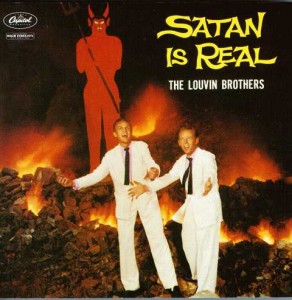 At first I was content to watch the world go by without benefit of soundtrack, but by the time I reached the outskirts of Albany, I was sorely in need of distraction. Stone-hard country music sounded just right to me, so I pulled out a
At first I was content to watch the world go by without benefit of soundtrack, but by the time I reached the outskirts of Albany, I was sorely in need of distraction. Stone-hard country music sounded just right to me, so I pulled out a 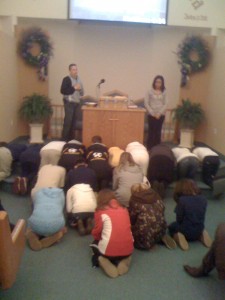 You can hear exactly what Charlie Louvin was talking about in their performance of
You can hear exactly what Charlie Louvin was talking about in their performance of 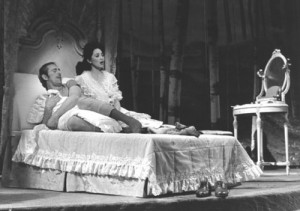 Having whiled away the better part of a nostalgic afternoon listening to Charlie and Ira as I motored west through rural New York, I decided that a change of key was in order, so I put on the original-cast album of Stephen Sondheim’s A Little Night Music, a musical whose songs portray sex and its discontents with a knowing worldliness that has nothing whatsoever in common with “Almost Persuaded” save for the fact that they, too, are in three-quarter time.
Having whiled away the better part of a nostalgic afternoon listening to Charlie and Ira as I motored west through rural New York, I decided that a change of key was in order, so I put on the original-cast album of Stephen Sondheim’s A Little Night Music, a musical whose songs portray sex and its discontents with a knowing worldliness that has nothing whatsoever in common with “Almost Persuaded” save for the fact that they, too, are in three-quarter time.
 Alan Ayckbourn’s “Intimate Exchanges,” first performed in 1983, consists of eight intertwined full-evening plays in which two actors portray a total of ten characters. The plays all start in the same way, then shear off in different directions—and each one is equipped with its own pair of alternate endings. While the complete cycle can only be presented in a festival setting, all of the plays are free-standing and can also be produced independently, and the Peterborough Players, who mounted a first-class revival of Mr. Ayckbourn’s “Absurd Person Singular” in 2013, are now doing “A Garden Fête,” inviting the members of the audience to vote on which ending will be performed.
Alan Ayckbourn’s “Intimate Exchanges,” first performed in 1983, consists of eight intertwined full-evening plays in which two actors portray a total of ten characters. The plays all start in the same way, then shear off in different directions—and each one is equipped with its own pair of alternate endings. While the complete cycle can only be presented in a festival setting, all of the plays are free-standing and can also be produced independently, and the Peterborough Players, who mounted a first-class revival of Mr. Ayckbourn’s “Absurd Person Singular” in 2013, are now doing “A Garden Fête,” inviting the members of the audience to vote on which ending will be performed.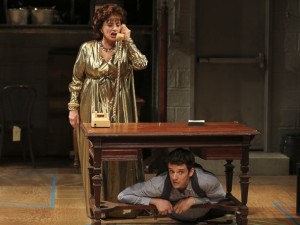 Many people who wind up devoting their lives to theater get their start in one of the countless small-town amateur troupes known as “community theaters.” Some are as absurdly awful as the one that is satirized on screen in “Waiting for Guffman,” while others are near-professional in quality. Most probably fall somewhere in between these two extremes. Douglas Carter Beane, who spent his teenage years acting with such a group, has now written a lightweight but charming autobiographical comedy—call it a memory farce—about what it’s like to do Shaw on a shoestring. While “Shows for Days” is no masterpiece, it’s unfailingly funny and disarmingly sweet, and if you’ve ever had anything to do with amateur theater, it will fill you with memories of the way you were once upon a time….
Many people who wind up devoting their lives to theater get their start in one of the countless small-town amateur troupes known as “community theaters.” Some are as absurdly awful as the one that is satirized on screen in “Waiting for Guffman,” while others are near-professional in quality. Most probably fall somewhere in between these two extremes. Douglas Carter Beane, who spent his teenage years acting with such a group, has now written a lightweight but charming autobiographical comedy—call it a memory farce—about what it’s like to do Shaw on a shoestring. While “Shows for Days” is no masterpiece, it’s unfailingly funny and disarmingly sweet, and if you’ve ever had anything to do with amateur theater, it will fill you with memories of the way you were once upon a time….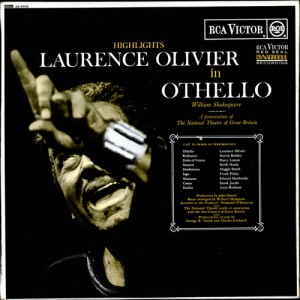 Anyone who’s seen Olivier’s Othello, which was
Anyone who’s seen Olivier’s Othello, which was